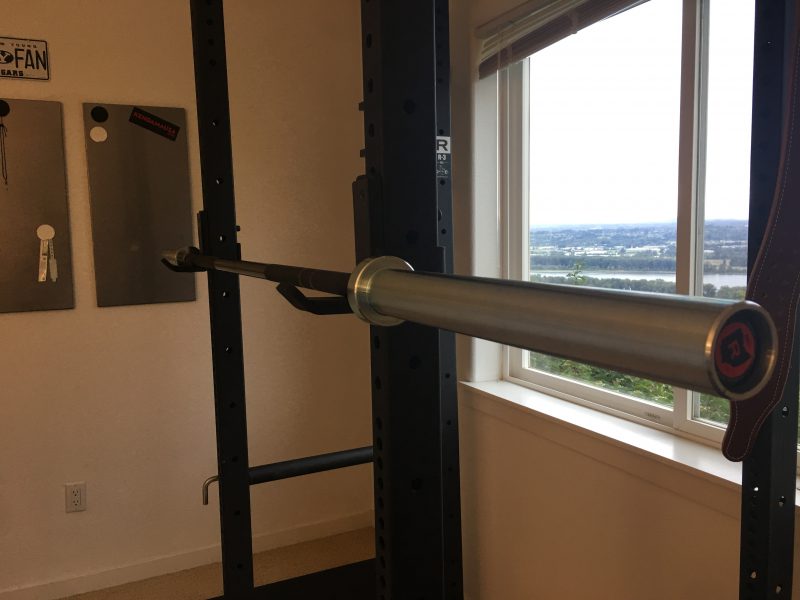This morning I engaged in Day Two of Weightlifting. It was big day for me, because:
I made it past Day One.
I’ve read all kinds of exciting things about how building muscle will strengthen my bones, straighten my spine and burn my fat. We’ll see.
Right now it feels like I’m ten years old again, using my noodly arms to shove my brother off when he’d sit on my chest and hock a loogy in my face. (He thought this was funny. It would have been, had it not been so abusive.)
Lying on the bench, pushing the weight of the bar (yes, just the bar) away from me, I took care to follow the manual’s strict instructions to focus my gaze on the ceiling:
the trainer said, look at the ceiling and just see the bar. The bar moves and the ceiling does not, and the ceiling is therefore your position reference for the bar.
In other words, I was allowed a glimpse of the bar out of the corner of my eye, but I wasn’t allowed to focus on it. This was tricky; how was I supposed to move the bar without even looking at it?
If I could stare that bar down—eye of the tiger and all that—surely I could beat it. Wasn’t that why people stared themselves down in the mirrors at the gym—to size up the challenge? Locking your gaze on the target feels good. But then the trainer went on to say this, and I’m not even making the all-caps part up:
DO NOT look at the bar as it moves; DO NOT follow the bar with your eyes, but just stare at the ceiling. You are going to make the bar go to that place every rep.
Man this trainer was bossy. But since he’s ripped and I’m me, I decided to give him his say. I looked at the ceiling, not the bar, and pushed. And then I pushed again, and again—all while keeping my gaze fixed on the ceiling. And guess what? My noodly arms were able to get that bar to the exact same place every single time.
I’d thought the bar was the thing, but it wasn’t. The ceiling was the thing.
And later (while mopping my floor, natch) it dawned on me: I am the bar. I am the bar. Not as long and slender, perhaps, but the bar nonetheless.

So if I am the bar, what is the ceiling? Well, that’s a loaded question. (Forgive the pun; we “load” weights on barbells. Okay, we don’t, but other people do. I load nothing because I can barely lift the bar.) But in short: if I am the bar, then the ceiling is whatever I’m aiming for.
It’s simple. Except it’s not.
Because if I am the bar—not the ceiling—it means I have to look past myself to get to where I need to be. Which is hard, because I’d really rather focus on myself, and only myself, all the time. (Have you noticed? I haven’t noticed if you’ve noticed; I’ve been too busy focusing on myself.)
Here’s a few examples:
Health. The ceiling is my goal of health and strength, and my body is the bar—or tool—that allows me to obtain it. So if I take my eye off the goal (health and strength) and cast it only to the tool (my body) my gaze lowers, my focus shifts, and I can’t get the bar—my body—anywhere.
This is why people who starve themselves to “get skinny” rarely stay that way; they focus on the tool instead of the goal; on their body instead of their health. (It’s also why staring at your muscles in the gym mirror doesn’t do a whole lot to build them.)
Learning. When we learn for the sake of learning—not just for “self-improvement”—we look beyond ourselves and, almost accidentally, improve ourselves. I’ve always thought that reading self-help books won’t improve us as much as reading good books will. If our aim is to really learn—not to pad ourselves with learning— then self-improvement will follow. Because bar follows the ceiling.
Relationships. This one’s tricky because it involves other, presumably flawed people But when we choose to care more about the ceiling of our relationship than the bar of our own feelings (pride, victimhood, resentment), we set our sights higher and our feelings fall into their proper place.
This doesn’t mean swallowing feelings to keep the peace; it means minimizing Self and maximizing Other. (Other doesn’t necessarily mean others. It means a goal other than Self.) It means we turn away from the mirror and toward the relationship. This takes discipline and humility and grit; it takes the best of our maturity. But it’s the only way we can get out of the way, so the bar can follow the ceiling—so we can adjust our self to the relationship instead of adjusting the relationship to our self. (Which never works anyway.)
Me. (And maybe you.) So this week, as I huff and grunt that big heavy bar toward the ceiling, I’m going to think about grunting my big heavy self—leaden with ego and indignation and self-pity—toward the ceiling too. I’m going to stop staring at the Bar Of Me. Because there are better things to glorify.
Sure, I’ll always be able to see the bar out of the corner of my eye, but that’s exactly how much emphasis it deserves in this upward push of life. I am relevant to the push, I’d even say I’m crucial. But I am not the destination of the push. I am not the ceiling.
And thank goodness for that.



